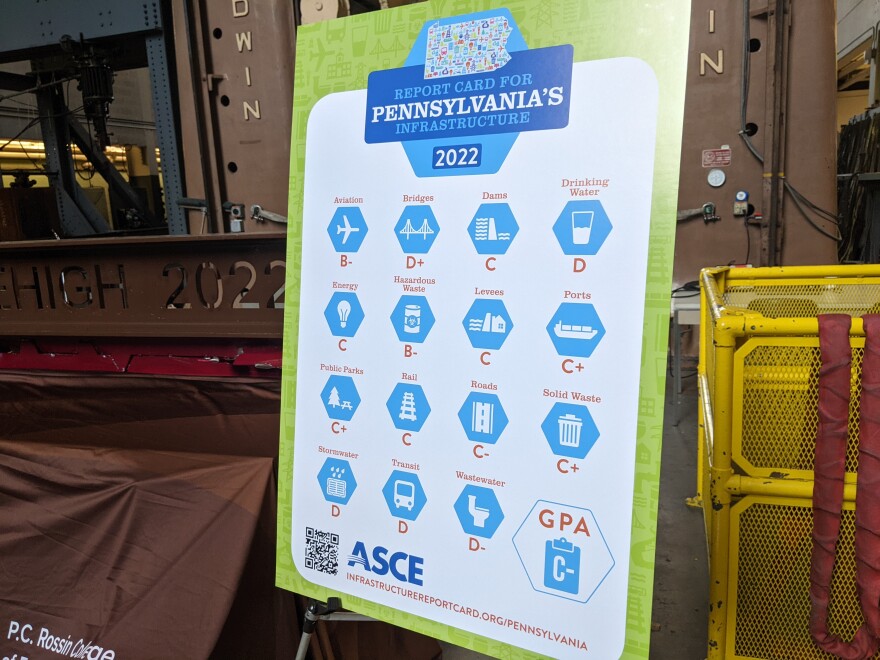BETHLEHEM, Pa. – One year after the signing of the Bipartisan Infrastructure Bill, Pennsylvania's infrastructure still only gets a C-minus.
The American Society of Civil Engineers (ASCE) announced the grade Tuesday at an event at Lehigh University's Fritz Engineering Laboratory.
- The civil engineers group ASCE gave Pennsylvania's infrastructure a C-minus in a new report announced at Lehigh University one year after the signing of the Bipartisan Infrastructure Bill
- The grade remains the same as the previous report made in 2018, but with some improvements in areas such as airlines
- Wastewater, stormwater, drinking water, transit and bridges were given ratings from D-plus to D-minus
- Funding challenges remain for many aspects of infrastructure improvement
More than 75 civil engineers throughout Pennsylvania who are members of the society contributed to the grading of different types of Pennsylvania's infrastructure, such as aviation, bridges, drinking water and energy.
The grade means the organization believes infrastructure in the state is mediocre and requires of attention.
A lack of improvement overall from the last report, which also gave the infrastructure a C-minus in 2018, is influenced by Pennsylvania's infrastructure being older than much of the country's, as well as a maintenance backlog, ASCE members said.
Recent challenges to infrastructure development include inflation's effect on acquiring materials and other expenses and the need for resiliency to extreme weather events to account for climate change effects.
The highest-graded piece of the infrastructure landscape for the state was aviation, given a B-minus because of various improvement and repair projects at airports throughout the state, paired with activity bouncing back after COVID-19.
Waste water, storm water, drinking water, transit and bridges were given ratings of a D-plus to a D-minus.
According to the accompanying report, the grade was low because of a funding gap of billions of dollars for replacements and repairs of public drinking, storm and waste water systems; the presence of contaminants; underfunding of public transportation; and an aging or poor condition of bridges throughout the state.
The last item was put into the national spotlight with the collapse of Pittsburgh's Fern Hollow Bridge this year.
"We don't look at what's under the ground until it breaks," John Caperilla, former president of the ASCE Lehigh Valley section, said at the event. "Unfortunately, we're getting into the cold weather season, and with that, you're going to see water main breaks. And it's just due to the aging infrastructure of those water lines, sewer overflows and other factors."
The event corresponded with a one-year anniversary of the signing of the Infrastructure Investment and Jobs Act, also known as the Bipartisan Infrastructure Bill.
Caperilla said he believes there will be tangible benefits that come out of the act, and hopes the next four years will see an increase in the grades for Pennsylvania.
"We want to see that investment come here to Pennsylvania, because investment in infrastructure produces jobs, it produces good living wages for our tradesmen, it provides good living wages for our design professionals or construction professionals in the engineering industry," Caperilla said.
"My wish list is the more money the better."
Ralph Eberhardt, chair of the Lehigh Valley Chamber of Commerce transportation board, said it's important to get a wellness check such as the report.
He said important projects such as Lehigh and Northampton Transportation Authority's enhanced bus service and using federal funding for road improvements such as a Route 309 interchange in Center Valley are examples of ways funding and focus on infrastructure will be used here.
Still, he said, there remains a pressure on the state to contribute its portion of the funding to projects covered under the new infrastructure bill.
"It's great to get the federal funding, but that puts the pressure on the states and their DOTs, in our case, PennDOT to come up with their 20%," Eberhardt said. "That's where our challenge comes in, how do we generate that revenue?"
"That's where our challenge comes in, how do we generate that revenue?"Ralph Eberhardt, chair of the Lehigh Valley Chamber of Commerce transportation board
During his remarks in the event, Eberhardt pointed to the Pennsylvania Department of Transportation's Transportation Revenue Options Commission Report to highlight new means of increasing revenue to fund new projects as part of the federal bill and otherwise.
Lehigh Valley Planning Commission's Becky Bradley and local state Senator Pat Browne served on the commission that developed that report.

To improve the grade in the future, the engineer organization recommends planning for flexible schedules and potential supply chain disruption, addressing funding gaps within state and local budgeting, addressing workforce challenges and ensuring projects are planned and implemented with economic, environmental and social effects in mind.
"This is an important issue that I think people need to be aware of and be on the forefront and continue to advocate to their local officials, their county commissioners, their state reps, state senators, as well as on a national level to continue to press on the issue of infrastructure," Caperilla said.
"When you spend on infrastructure you're gonna get you're gonna get a good return on investment."


